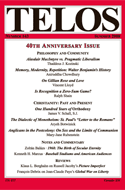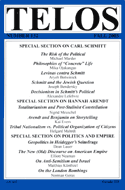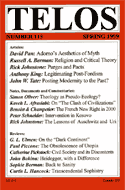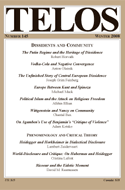By Lev Marder · Tuesday, June 22, 2010 On Tuesdays at the TELOSscope blog, we reach back into the archives and highlight an article whose critical insights continue to illuminate our thinking and challenge our assumptions. Today, Lev Marder looks at Aniruddha Chowdhury’s“Memory, Modernity, Repetition: Walter Benjamin’s History,” from Telos 143 (Summer 2008).
 Reaching into the Telos archive to retrieve Aniruddha Chowdhury’s essay “Memory, Modernity, Repetition: Walter Benjamin’s History” proves to be a troubling task. In the article, Chowdhury masterfully treats Benjamin’s concept of history, which I prefer to an extent to conflate with historiography. The more attentively one reads Chowdhury’s work, the more apparent it becomes that it resists being mundanely archived and treated just as another artifact. Sticking out of the archive, it also defies the reader who wonders where to start reading the text. Accustomed to starting from the beginning, the reader rarely questions the method of reading, the method of interpreting, and the mode of historiography. Without a doubt these questions relate to the (mis)understanding of temporality and its limits. Reaching into the Telos archive to retrieve Aniruddha Chowdhury’s essay “Memory, Modernity, Repetition: Walter Benjamin’s History” proves to be a troubling task. In the article, Chowdhury masterfully treats Benjamin’s concept of history, which I prefer to an extent to conflate with historiography. The more attentively one reads Chowdhury’s work, the more apparent it becomes that it resists being mundanely archived and treated just as another artifact. Sticking out of the archive, it also defies the reader who wonders where to start reading the text. Accustomed to starting from the beginning, the reader rarely questions the method of reading, the method of interpreting, and the mode of historiography. Without a doubt these questions relate to the (mis)understanding of temporality and its limits.
Continue reading →
By Lev Marder · Tuesday, April 13, 2010 On Tuesdays at the TELOSscope blog, we reach back into the archives and highlight an article whose critical insights continue to illuminate our thinking and challenge our assumptions. Today, Lev Marder looks at Kai Evers’s “The Holes of Oblivion: Arendt and Benjamin on Storytelling in the Age of Totalitarian Destruction,” from Telos 132 (Fall 2005).
 Totalitarianism drives people to silence, to defend their positions, to speak out, to cry out, and even to turn on themselves. Out of totalitarianism come some of the most incredible witness accounts, histories, and stories about these stories. Eventually theories about the theories of those stories, such as Kai Evers’s essay “The Holes of Oblivion: Arendt and Benjamin on Storytelling in the Age of Totalitarian Destruction,” emerge and peek through their holes. Juxtaposing Benjamin’s firm position that only silence could follow a catastrophe and Arendt’s rejection of this stance after accepting it, Evers questions whether or not storytelling is dead. Is it possible that the holes of oblivion designated by Arendt as the core of totalitarianism, where people and their traces seem to disappear, exist and totally efface? Totalitarianism drives people to silence, to defend their positions, to speak out, to cry out, and even to turn on themselves. Out of totalitarianism come some of the most incredible witness accounts, histories, and stories about these stories. Eventually theories about the theories of those stories, such as Kai Evers’s essay “The Holes of Oblivion: Arendt and Benjamin on Storytelling in the Age of Totalitarian Destruction,” emerge and peek through their holes. Juxtaposing Benjamin’s firm position that only silence could follow a catastrophe and Arendt’s rejection of this stance after accepting it, Evers questions whether or not storytelling is dead. Is it possible that the holes of oblivion designated by Arendt as the core of totalitarianism, where people and their traces seem to disappear, exist and totally efface?
Continue reading →
By Lev Marder · Tuesday, January 26, 2010 Each Tuesday in the TELOSscope blog, we reach back into the archives and highlight an article whose critical insights continue to illuminate our thinking and challenge our assumptions. Today, Lev Marder looks at Russell Berman’s article “From Brecht to Schleiermacher: Religion and Critical Theory,” from Telos 115 (Spring 1999).
 Enlightenment forced the individual to turn toward the light and become “enlightened.” Two centuries after this compelling, compulsive transformation began, where has education guided, or misguided, its followers? In Russell Berman’s article “From Brecht to Schleiermacher: Religion and Critical Theory,” a tortured figure emerges. When considering the chastised innocent victim in a discussion of religion, one is conditioned to think back to the inquisition by the Church, stoning under Islamic shariah law, etc. Yet can the discussion of religion be dismissed, condemned, outlawed, or silenced on the basis of the most egregious episodes? Is this figure suffering simply because of religion or, rather, because of a certain dogmatism that is in need of critical discussion? These are some of the questions Berman examines in his article. Enlightenment forced the individual to turn toward the light and become “enlightened.” Two centuries after this compelling, compulsive transformation began, where has education guided, or misguided, its followers? In Russell Berman’s article “From Brecht to Schleiermacher: Religion and Critical Theory,” a tortured figure emerges. When considering the chastised innocent victim in a discussion of religion, one is conditioned to think back to the inquisition by the Church, stoning under Islamic shariah law, etc. Yet can the discussion of religion be dismissed, condemned, outlawed, or silenced on the basis of the most egregious episodes? Is this figure suffering simply because of religion or, rather, because of a certain dogmatism that is in need of critical discussion? These are some of the questions Berman examines in his article.
Continue reading →
By Lev Marder · Tuesday, December 1, 2009 Each Tuesday in the TELOSscope blog, we reach back into the archives and highlight an article whose critical insights continue to illuminate our thinking and challenge our assumptions. Today, Lev Marder looks at David M. Rasmussen’s “Preserving the Eidetic Moment: A Contribution of Phenomenology to Critical Theory,” from Telos 145 (Winter 2008).
 As with Paul Ricouer’s work, David M. Rasmussen’s article “Preserving the Eidetic Moment: A Contribution of Phenomenology to Critical Theory,” from Telos 145, can be praised for refusing to think of theory and praxis in oppositional terms and for preserving the eidetic moment. Relying on his vast experience with the living works he engages and with the theorists of the phenomenological/hermeneutical and critical theory traditions, Rasmussen’s essay exemplifies how theory blends into praxis and praxis into theory. Deliberately injecting subjectivity into an essay that most theorists would claim requires a “scientific” approach, he refuses to hide the subjectivity at the essence of all expression. Where was subjectivity lost in Western thought’s understanding of identity and why should it, why can it, be recovered? As with Paul Ricouer’s work, David M. Rasmussen’s article “Preserving the Eidetic Moment: A Contribution of Phenomenology to Critical Theory,” from Telos 145, can be praised for refusing to think of theory and praxis in oppositional terms and for preserving the eidetic moment. Relying on his vast experience with the living works he engages and with the theorists of the phenomenological/hermeneutical and critical theory traditions, Rasmussen’s essay exemplifies how theory blends into praxis and praxis into theory. Deliberately injecting subjectivity into an essay that most theorists would claim requires a “scientific” approach, he refuses to hide the subjectivity at the essence of all expression. Where was subjectivity lost in Western thought’s understanding of identity and why should it, why can it, be recovered?
Continue reading →
|
|
 Reaching into the Telos archive to retrieve Aniruddha Chowdhury’s essay “Memory, Modernity, Repetition: Walter Benjamin’s History” proves to be a troubling task. In the article, Chowdhury masterfully treats Benjamin’s concept of history, which I prefer to an extent to conflate with historiography. The more attentively one reads Chowdhury’s work, the more apparent it becomes that it resists being mundanely archived and treated just as another artifact. Sticking out of the archive, it also defies the reader who wonders where to start reading the text. Accustomed to starting from the beginning, the reader rarely questions the method of reading, the method of interpreting, and the mode of historiography. Without a doubt these questions relate to the (mis)understanding of temporality and its limits.
Reaching into the Telos archive to retrieve Aniruddha Chowdhury’s essay “Memory, Modernity, Repetition: Walter Benjamin’s History” proves to be a troubling task. In the article, Chowdhury masterfully treats Benjamin’s concept of history, which I prefer to an extent to conflate with historiography. The more attentively one reads Chowdhury’s work, the more apparent it becomes that it resists being mundanely archived and treated just as another artifact. Sticking out of the archive, it also defies the reader who wonders where to start reading the text. Accustomed to starting from the beginning, the reader rarely questions the method of reading, the method of interpreting, and the mode of historiography. Without a doubt these questions relate to the (mis)understanding of temporality and its limits.  Totalitarianism drives people to silence, to defend their positions, to speak out, to cry out, and even to turn on themselves. Out of totalitarianism come some of the most incredible witness accounts, histories, and stories about these stories. Eventually theories about the theories of those stories, such as Kai Evers’s essay “The Holes of Oblivion: Arendt and Benjamin on Storytelling in the Age of Totalitarian Destruction,” emerge and peek through their holes. Juxtaposing Benjamin’s firm position that only silence could follow a catastrophe and Arendt’s rejection of this stance after accepting it, Evers questions whether or not storytelling is dead. Is it possible that the holes of oblivion designated by Arendt as the core of totalitarianism, where people and their traces seem to disappear, exist and totally efface?
Totalitarianism drives people to silence, to defend their positions, to speak out, to cry out, and even to turn on themselves. Out of totalitarianism come some of the most incredible witness accounts, histories, and stories about these stories. Eventually theories about the theories of those stories, such as Kai Evers’s essay “The Holes of Oblivion: Arendt and Benjamin on Storytelling in the Age of Totalitarian Destruction,” emerge and peek through their holes. Juxtaposing Benjamin’s firm position that only silence could follow a catastrophe and Arendt’s rejection of this stance after accepting it, Evers questions whether or not storytelling is dead. Is it possible that the holes of oblivion designated by Arendt as the core of totalitarianism, where people and their traces seem to disappear, exist and totally efface?  Enlightenment forced the individual to turn toward the light and become “enlightened.” Two centuries after this compelling, compulsive transformation began, where has education guided, or misguided, its followers? In Russell Berman’s article “From Brecht to Schleiermacher: Religion and Critical Theory,” a tortured figure emerges. When considering the chastised innocent victim in a discussion of religion, one is conditioned to think back to the inquisition by the Church, stoning under Islamic shariah law, etc. Yet can the discussion of religion be dismissed, condemned, outlawed, or silenced on the basis of the most egregious episodes? Is this figure suffering simply because of religion or, rather, because of a certain dogmatism that is in need of critical discussion? These are some of the questions Berman examines in his article.
Enlightenment forced the individual to turn toward the light and become “enlightened.” Two centuries after this compelling, compulsive transformation began, where has education guided, or misguided, its followers? In Russell Berman’s article “From Brecht to Schleiermacher: Religion and Critical Theory,” a tortured figure emerges. When considering the chastised innocent victim in a discussion of religion, one is conditioned to think back to the inquisition by the Church, stoning under Islamic shariah law, etc. Yet can the discussion of religion be dismissed, condemned, outlawed, or silenced on the basis of the most egregious episodes? Is this figure suffering simply because of religion or, rather, because of a certain dogmatism that is in need of critical discussion? These are some of the questions Berman examines in his article.  As with Paul Ricouer’s work, David M. Rasmussen’s article
As with Paul Ricouer’s work, David M. Rasmussen’s article 

